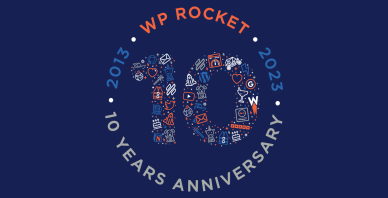Table of Contents
Last update on
It’s no secret that WP Rocket’s support team is the backbone of the company’s success. Being a premium and GPL plugin, our competitive advantage is deeply rooted in providing support to our users. In fact, “Simplicity and Support” has always been our founders’ motto. These are the two key elements on which the company was built and the driving forces behind our product. Did you know that our very first hire was for our support team?
Our customer service team currently serves more than 150,000 customers worldwide by teaching them how to use WP Rocket — our awesome caching plugin for WordPress websites — and providing day-to-day assistance with their performance-related questions. Each support team member is a master of the technicalities of WP Rocket and a fabulous customer service pro too, meaning that clients always get expert guidance with a dollop of friendliness that makes a world of difference.
With a growing number of customers and almost 1,500,000 websites using WP Rocket, providing exceptional customer service comes with a string of challenges that we are planning to address this year. We spoke to Ian Humber, our Head of Support, about where we are today and how we plan to change for the future. We will start by presenting the team and how we work before moving on to what our next steps are, including a shift towards proactive support and customer self-service.
Nurturing Our Strengths: Expertise and Friendliness
We are not just a caching plugin. We want to deliver great customer service, too. Sure, we’re all about speeding up websites. But above all, we love assisting our users with their technical issues related to WP Rocket and answering all of their performance-related questions. Our customer support team members are the people that make it happen. And it’s working: every week, our customer satisfaction rating is excellent. However, we know that we need to make some adjustments if we want to keep that trend going.
Because caring for our customers is so important to us, our support team of 20 people makes up the largest team in our company. The team is spread across different time zones (mainly the US and Europe) to answer queries from customers based all over the world. There are two different sides to the support we provide. On the one hand, it’s about managing accounts and customer expectations. On the other, we offer proper tech support and help customers fix any glitches they run into. To deal with the latter, we even have specialist engineers.
It might be a small team but it’s definitely a mighty one. As Ian so rightly puts it, “providing excellent customer support isn’t so much about the size of the team but about the value you bring to your customers using the resources you have.” Yes to that!
So, what’s the secret behind our great support? First off, each support team member not only understands the product but also how customers use the product. The knowledge our team brings to the table is what makes a real difference. When customers face an issue or have a question, they are met with people who have genuine expertise, experience with the product, and thorough technical know-how.
How do we make sure that knowledge flows within the team and that each team member stays up-to-date? At WP Rocket, we encourage collaborative work and reaching out to each other for help. The way Ian sees it is that nobody knows everything about everything and reaching out is never a sign of weakness. “At the end of the day, when a customer turns to us, they are effectively asking for the entire team’s knowledge”. This approach creates a win-win situation: a quick resolution of the customer’s problem and more knowledge for the entire team.
Our strength also lies in the fact that we provide support with a friendly smile that you can practically see through our emails. Driven by a real desire to help, all of our support team members share the same qualities of empathy and altruism.“Everybody’s goal is to improve our users’ experience and help them get the best of what they purchased.” In other words, our team cares about you.
The Challenges That Lie Ahead
You probably understand by now that the support we provide our customers with is equally as important as the performance of our plugin. In fact, it’s fair to say that it is our competitive advantage. However, offering excellent support is not always a walk in the park – it takes constant effort. The same way we are always trying to improve our product, we are also always trying to better the way we help our customers.
Every week, our team serves thousands of customers and sends out an even higher number of emails. We pride ourselves on the quality of our support and the answers we bring to our customers. We try to solve every issue brought to our attention and help our customers have the best experience possible with our product. So much focus on quality means that we’ve sometimes lagged behind in terms of response time. We are now planning on improving the latter.
The wonderful thing about having a knowledgeable team is that issues raised by customers are usually resolved very quickly. But with so many requests coming our way, the problem we face is more about the time it takes to assign a specific ticket to one of our team members. This means that over the years, we’ve actually increased our response time. Our number one priority for the year to come is thus to cut our response time.
Here’s how we have started addressing the issue head first:
- Remember when were off over the weekend? Those days are gone. Don’t worry, our customer service team still gets to enjoy time off during the week! However, we now provide support every day so if you need to open a ticket on a Saturday, you can, and we will handle it as soon as possible.
- Up until now, we assigned tickets randomly on a first come first serve basis. While we are still dealing with tickets as they arrive, we are more methodical in how we assign them. We have now divided the team into areas of specialization: some members will handle bug fixes while others will deal with development issues for example. This approach helps us be more efficient in processing requests.
- We’ve hired more exceptional people to support the team. Adame, Natalia, Jorge, and Sandy joined us as Technical Support agents while Joao and Joseph are now part of the Customer Support team. Adina is our new Online Presales specialist and Ian joined the company as Head of Support.
So, what’s coming next? This year, the major change in how we approach customer care is a shift towards customer self-service and proactive support. Let’s see exactly what that means.
The Shift to Customer Self-Service
The high volume of requests we receive from customers each day means that our response time is longer than we would like. Sure, we could hire more people every week, train them, and end up with a customer support team the size of an army. However, that strategy is not particularly sustainable long-term and at WP Rocket, we like efficiency. That approach is also not aligned with our values as a company. We pride ourselves on being a small company providing quality, personalized answers to our customers. We’re real people helping real people.
When we analyzed the requests for help we were receiving, we saw patterns in the issues that were raised. There were repetitions in terms of the problems encountered by our customers. The answers to their questions were usually pretty straightforward and only required very light support from our side. We asked ourselves if it was possible to provide our customers with answers without them having to contact support. We decided to offer more documentation, create opportunities for users to make a diagnosis themselves, and solve their issues on their own.
Ian has a rather medical analogy to explain this shift: “When you cut your finger, you usually don’t need to see a doctor. Instead, you know that you have to apply a bandaid and that’s the end of it. If you break a leg, it’s a different story and you will require medical attention. The same approach applies when reaching out to our support team. Not all issues require shooting an email to support.”
The new Help Center on our website is a step in that direction. We wanted to help our users find answers to their questions without having to immediately contact our support team. Before the Help Center, there was no filter to contact our support team. Not that we don’t want customers reaching out to us anymore (far from it!) but we believe that in some cases, it’s more beneficial for them to directly have access to the information they are after. It saves them time, rather than having to wait for someone from our team to get back to them. Similarly, we’ve added video tutorials inside the plugin itself to help users understand our product better and handle any issues themselves.
From a Reactive Model to a Proactive One
For Ian, when a user contacts customer support, it means that there was a failure on our part to deliver what the user wanted or needed. Our goal is to address these failures before they arise: we need to be more proactive in our approach. So, how do we anticipate our customers’ issues and better address them?
Being proactive means staying one step ahead. With the Core Web Vitals coming up later this year, we know that the topic will raise questions among our customers. That’s why our team is already preparing documentation on the matter. By building a proper knowledge management system packed full of educational and helpful content, we want to prevent issues from happening later on.
Providing customers with the ability to self-help is another way to do that. By improving the available documentation, we give customers the opportunity to help themselves before they resort to reaching out to us. If users find the answers themselves, the team has also more time to provide technical support for more complex issues that need special attention. It also frees up time for light consultancy rather than purely technical support. One of the objectives for this year is indeed to help our customers beyond their tickets.
While our support team has always received great ratings and praise from our users, our ultimate goal is to go one step further and bring even more value to them. We don’t just want to solve our users’ issues, we want to provide them with additional support, actionable tips, and advice on web performance. All in all, we like to go the extra mile.
Conclusion
Providing great customer support with a growing user base isn’t always easy. Trying to constantly bring more value to your customers isn’t always easy. Nurturing positive feedback isn’t always easy. But we are trying our absolute best and we think we are doing a pretty good job – with room for improvement of course!
When asked what the mantra of his team was, Ian immediately replied: “Learn from the tickets. Stop the same tickets from arriving again. Anticipate the tickets.”
And that’s exactly what he plans on doing this year thanks to customer self-service and proactive support.



